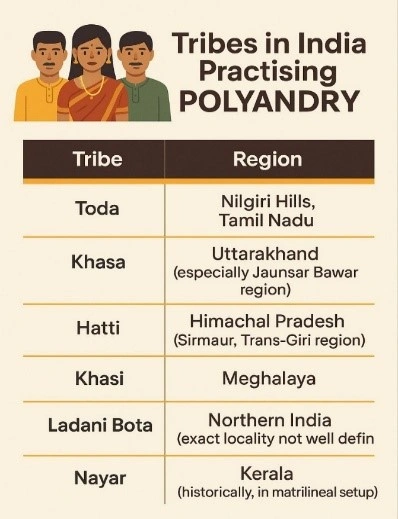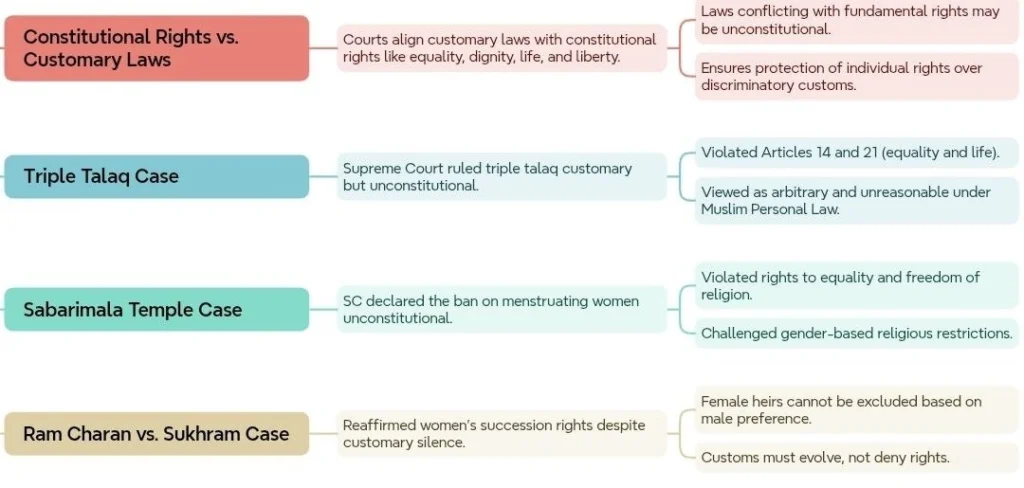Paper: GS – I/II, Subject: Society and Social Justice, Topic: Diversity of India, Issue: Polyandry.
Context:
The Trans-Giri region of Himachal Pradesh recently saw Sunita Chauhan marry two brothers, Pradeep and Kapil Negi, continuing the ‘Jodidaran’ tradition of polyandry practiced by the Hatti tribe.
Key Takeaways:
Who Are the Hattis?
- The Hattis are a Scheduled Tribe (ST) recognized in Himachal Pradesh and found in Trans-Giri region and Jaunsar Bawar in Uttarakhand.
- They derive their name from their historical role as vendors in haats (rural markets) where they sold local produce, wool, and meat.

| What is Polyandry? Polyandry is a form of marriage where one woman marries multiple men. It is of two main types: Fraternal (Adelphic): All husbands are brothers. Non-Fraternal: Husbands are unrelated, and share the woman by rotation. |
This tribe was granted Scheduled Tribe (ST) status by the Central Government in 2022.
- The practice of polyandry is rooted in the desire to preserve undivided family land, especially agricultural land.
- Proponents argue that it strengthens familial bonds between brothers and provides women with greater security.
Legality of Polyandry in India:
- General Prohibition: Polyandry and polygamy are generally outlawed in India under the Special Marriages Act, the Hindu Marriage Act, 1955, and Section 82 of the Bharatiya Nyaya Sanhita: Bigamy is Punishable.
- Customary Laws and STs: While religious personal laws govern marriage, the Constitution recognizes the relevance of customary laws among STs.
- Article 342 of the Constitution: Recognizes STs and accords them a distinct legal status.
- Hindu Marriage Act, 1955: Governs marriage for Hindus, Buddhists, Jains, and Sikhs.
- Section 2(2): Excludes STs from the Act’s provisions “unless the Central Government, by notification in the Official Gazette, otherwise directs.”
- In the absence of such notification, the Hatti tribe continues to be governed by their undocumented and uncodified customary laws.
- Definition of “Custom” (Section 3 of the Act): A rule that has been “observed for a long time, has obtained the force of law.”
- Validity of Customary Law: To be valid, a customary law must meet the standards of certainty, reasonableness, and consistency with public policy.
- Courts require proper evidence to recognize customary laws.
Uniform Civil Code (UCC) and STs:
- Debate on Applicability: There is ongoing debate about applying a Uniform Civil Code (UCC) to situations involving customary practices like polyandry.
- Uttarakhand UCC, 2024: Provides a legal framework for inheritance, marriage, divorce, and adoption.
- Mandates marriage registration.
- Establishes equal rights for spouses across religions and communities.
- Prohibits polygamy.
- Exclusion of STs: Does not apply to STs, following the Constitutional pattern of upholding their customary practices.
- Section 2 of the Uniform Civil Code Rules, Uttarakhand, 2025: Explicitly states that the rules do not apply to members of any Scheduled Tribes as defined in the Constitution, nor to those whose customary rights are protected under Part XXI of the Constitution.
Court Decisions and Customary Laws:

It is influenced by the interplay between codified laws, constitutional rights, and the recognition afforded to customary practices of Scheduled Tribes. Courts are increasingly scrutinizing customary laws to ensure they align with fundamental rights, potentially leading to challenges to practices like polyandry if they are deemed discriminatory or violate constitutional principles.
La Excellence IAS Academy, the best IAS coaching in Hyderabad, known for delivering quality content and conceptual clarity for UPSC 2025 preparation.
FOLLOW US ON:
◉ YouTube : https://www.youtube.com/@CivilsPrepTeam
◉ Facebook: https://www.facebook.com/LaExcellenceIAS
◉ Instagram: https://www.instagram.com/laexcellenceiasacademy/
GET IN TOUCH:
Contact us at info@laex.in, https://laex.in/contact-us/
or Call us @ +91 9052 29 2929, +91 9052 99 2929, +91 9154 24 2140
OUR BRANCHES:
Head Office: H No: 1-10-225A, Beside AEVA Fertility Center, Ashok Nagar Extension, VV Giri Nagar, Ashok Nagar, Hyderabad, 500020
Madhapur: Flat no: 301, survey no 58-60, Guttala begumpet Madhapur metro pillar: 1524, Rangareddy Hyderabad, Telangana 500081
Bangalore: Plot No: 99, 2nd floor, 80 Feet Road, Beside Poorvika Mobiles, Chandra Layout, Attiguppe, Near Vijaya Nagara, Bengaluru, 560040
